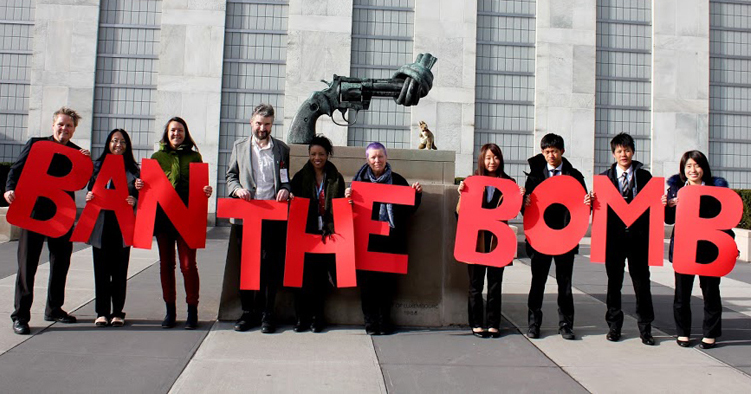Global ban on nuclear weapons in sight
A historic Treaty, which could rid the world of nuclear weapons, has gained fifty nation states' signatories on the first day, at the United Nations. Quakers in Britain are urging the UK Government to sign.

Quakers in Britain have campaigned against nuclear weapons since 1955 when Meeting for Sufferings, the Quaker decision-making body, said, "To rely on the possession of nuclear weapons as a deterrent is faithless; to use them is a sin." Quakers have been active at every level, from street campaigns and actions, to policy and strategy.
Today, Quakers have been observers at the UN in New York. Tim Wallis, formerly Peace and Disarmament Programme Manager for Quakers in Britain, says: “This treaty represents world public opinion and the global values and norms which agree that nuclear weapons are, in fact, illegal and unacceptable to human beings."
[QUOTE-START]
Arming the world is about fear. We want to promote the Christian understanding of hope rather than the death and destruction symbolised by these terrible weapons
- Juliet Prager, Deputy Recording Clerk
[QUOTE-END]
The Treaty on the Prohibition of Nuclear Weapons was adopted in July by two-thirds of the 193 UN member states. The UK Government refused to sign, saying instead, it is committed to the Non-Proliferation Treaty, which aims to prevent the spread of nuclear weapons and weapons technology.
On Wednesday a letter, initiated by Campaign for Nuclear Disarmament was published in the Guardian, signed by faith representatives and peace groups.
Juliet Prager, Deputy Recording Clerk, signed the Guardian letter for Quakers in Britain. She said, “Arming the world is about fear. We want to promote the Christian understanding of hope rather than the death and destruction symbolised by these terrible weapons."
The text of the letter follows:
"Around the world there are growing fears about the prospect of a nuclear war. The US-North Korea nuclear crisis is a terrifying reminder of the dangers of nuclear weapons and a powerful, yet unwelcome, riposte to the nuclear states who have long argued that these weapons of mass destruction deter war. But there is an alternative. The overwhelming majority of states want abolition of all nuclear weapons and have taken matters into their own hands. A legally binding nuclear weapons ban treaty has been agreed by 122 states at the UN, the culmination of decades of global civil society campaigning.
"That treaty opens for signature today, and more than 100 states are set to sign this ground-breaking document. This is an open invitation from the majority of the world's states to all countries to sign up and work to make the abolition of nuclear weapons a reality. Our government says it is committed to the same aim, yet it boycotted the talks that produced the treaty and insists the UK will never sign. But the opportunity is there; the UK must seize it and work to make a success of it. The alternative is spiralling nuclear proliferation, massively increased danger and inevitable annihilation. For all our futures, we urge Theresa May to sign the treaty."
Caroline Lucas MP Chair Parliamentary CND, Malcolm McMahon Archbishop of Liverpool, Kelvin Hopkins MP, Mark Serwotka PCS union, Stephen Cottrell Bishop of Chelmsford, Mohammed Kozbar Muslim Association of Britain, Tommy Sheppard MP, Hywel Williams MP, Kate Hudson CND general secretary, Jill BakerMethodist Church in Britain, Juliet Prager Quakers in Britain, Ronnie Cowan MP
What the Treaty says:
- clearly and unambiguously prohibits the development, testing, production, acquisition, possession, stockpiling, transfer, use or threat of use of nuclear weapons.
- prohibits signatory countries from assisting, encouraging or inducing any other country to engage in those activities.
- prohibits the stationing, installation or deployment of nuclear weapons at any place under its jurisdiction or control.
- requires signatory countries who may have or have had nuclear weapons in the past to cooperate with the relevant international authorities for the purpose of verifying the irreversible elimination of their nuclear weapons programme.